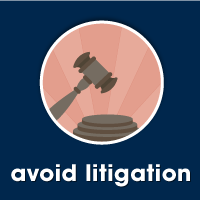Could Your Company’s Videos Get You Sued for ADA Noncompliance?
 If your organization provides videos on your website or through a service like YouTube or Vimeo, you may be placing yourself in the crosshairs of a lawsuit.
If your organization provides videos on your website or through a service like YouTube or Vimeo, you may be placing yourself in the crosshairs of a lawsuit.
Recently Harvard and MIT were both sued by advocates for the deaf for violating anti-discrimination laws by failing to provide closed-captioning in their online classes, podcasts and other online media.
The National Association of the Deaf accused the universities of violating the Americans with Disabilities Act (ADA), stating that the materials were either unintelligibly captioned or completely uncaptioned, making it impossible for hearing-impaired viewers to understand the content.
Could You Get Sued for ADA Noncompliance?
While many businesses may be tempted to disregard the suit because it targets two prominent universities, every company—large and small—should consider it a shot over their bow. The ADA requires businesses to ensure that persons with disabilities have the same access to the same services that the general public has. In this case, it means that everyone should be able to understand the videos you produce and make public. Uncaptioned or poorly captioned videos can legitimately put you at risk for legal action.
Guidelines for Creating Closed Captions
While YouTube and Vimeo have features that can automatically caption your videos, they generally do a poor job and require thorough manual review and editing. Don’t rely on automatic captioning to keep you in compliance with the ADA.
When transcribing multimedia for captioning, follow these guidelines:
- Start with speech-to-text programs. You can use your video software or YouTube for this. It quickly creates captions, but they won’t be accurate enough on their own.
- Go back and manually edit the text. This way, you’re just fixing problem spots rather than typing in the entire text.
- Make sure the captioning is in sync with the audio.
- Use a transcription service for live events, or if you have long videos to caption. Expect manual captioning to take eight times as long as the video itself.
Getting Help with Video Captioning Compliance
The World Wide Web Consortium (W3C) offers a helpful FAQ about making videos accessible. This is a good starting point, but you may have specific questions about your multimedia. Our accessibility experts are available to work closely with you to ensure all of your online media is 100% ADA-compliant. We guarantee it!